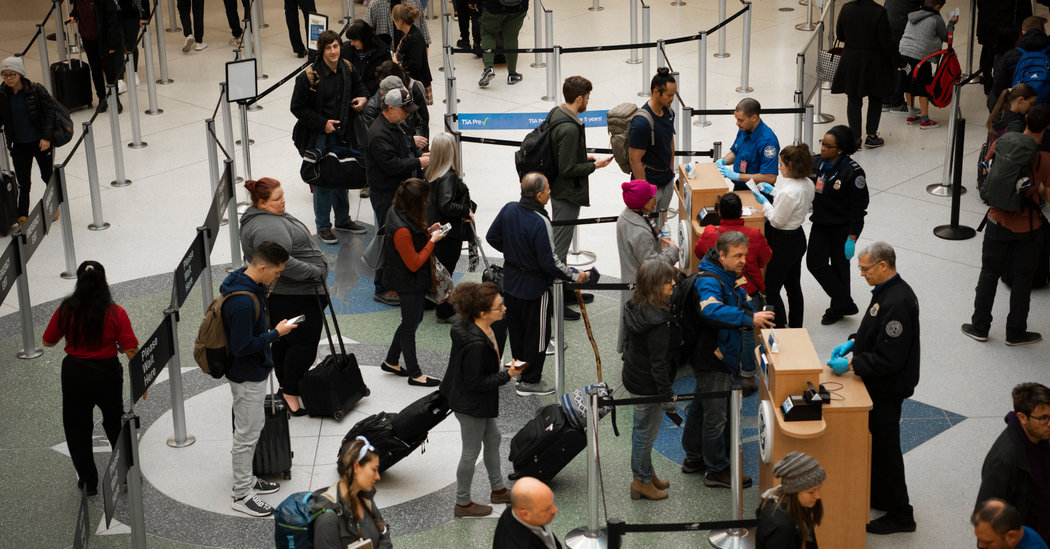(Want to get this briefing by email? Here’s the sign-up.)
Good morning.
We’re covering the temporary suspension of new green cards in the U.S., the threat the coronavirus pandemic poses to the American oil industry, and the 50th anniversary of Earth Day.
President Trump narrows call to ban immigration
The president said on Tuesday that he would order a 60-day halt in issuing green cards, but he backed away from plans to suspend guest worker programs after criticism from business groups that feared losing access to foreign labor.
American citizens seeking to bring their children or spouses to the U.S. would still be allowed to do so, officials said, but the path to living and working in the country legally would be blocked for others. One analysis estimated that the policy could affect as many as 660,000 people.
Solving the virus’s mysteries
The genetic building block of the coronavirus that was detected in a Seattle-area man who was the country’s first confirmed infection has become a crucial clue for scientists trying to understand how the pathogen gained a foothold in the U.S.
A genetically similar version of the virus — directly linked to that first case in Washington — was identified across 14 other states and around the world.
Another angle: Two new studies using antibody tests to assess how many people have been infected have turned up higher numbers than some experts had expected.
China helped sow panic, U.S. officials say
Alarming messages that popped up last month on cellphones and social media feeds of millions of Americans warned that the Trump administration was about to lock down the entire country.
American officials said the operatives had adopted some of the techniques mastered by Russia-backed trolls, such as creating fake social media accounts to push messages to receptive Americans, who in turn unwittingly help spread them.
Related: China’s state propaganda machine has highlighted other countries’ mistakes during the pandemic while suppressing domestic problems, fueling anger toward foreigners and domestic critics alike, our columnist writes.
If you have 7 minutes, this is worth itPreparing for Australia’s next wildfires
But what’s most needed is tackling climate change, says one former fire commissioner: “It’s a bit like going to a gas fire and putting out all the houses and burning cars around it but not turning off the gas.”
Here’s what else is happening
Report on Russian interference: A Republican-led Senate review unanimously supported the conclusion of the intelligence community that Russia interfered in the 2016 election, undercutting claims by President Trump and his allies that the findings were those of a “deep state” seeking to undermine his victory.
Snapshot: Above, the golden lion tamarin, which lives only in Brazil. There are about 2,500 tamarins in the wild today, and conservationists are hoping to ensure the monkeys’ survival by expanding the natural habitat.
Back with Brady: Rob Gronkowski, the All-Pro tight end who left the N.F.L. after the 2018 season, plans to return to the league to reunite with Tom Brady, his New England Patriots teammate, on the Tampa Bay Buccaneers.
Late-night comedy: Stephen Colbert addressed President Trump’s plan to limit immigration to the U.S.: “Well, I don’t necessarily agree with it, but it is probably the safest thing for the immigrants. Because right now, America is basically a petri dish on the floor of a bus station men’s room.”
What we’re reading: This remembrance in Rolling Stone. Kevin McKenna, a Business editor, suggests this “wonderful account of the a concert-going life of my friend Ron Louie,” a designer who helped The Times start its first website in the 1990s. He died of complications from the coronavirus last month.
Now, a break from the news
We have more ideas about what to read, cook, watch and do while staying safe at home.
And now for the Back Story on …Earth Day turns 50
Today is Earth Day, the annual event established to raise awareness about the state of our planet. John Schwartz, a Times reporter who covers climate change, spoke about what Earth Day means five decades later.
In broad terms, what has changed since 1970?
The air over the U.S. is much cleaner, and so is the water we drink in most parts of the country. We don’t use DDT or asbestos. But other threats have arisen. The biggest of those — the issue that wasn’t really on the radar for most people in 1970 — is climate change. Scientific eence has grown and scientific consensus has gelled, and so now we recognize that there are threats that are more fundamental, and ultimately more harmful, than we ever knew 50 years ago.
With the coronavirus crisis dominating our lives, is Earth Day relegated to a second-tier event this year?
It’s anything but second-tier, but it’s virtual. You won’t have millions marching in the streets, but there are activities all around the world. Young climate strikers are speaking out. The modern-day equivalents of the 1970 “teach-ins” are happening online.
That’s it for this briefing. See you next time.
— Chris
Thank youTo Ali Slagle for the recipe, and to Theodore Kim and Jahaan Singh for the rest of the break from the news. You can reach the team at [email protected].
P.S. We’re listening to “The Daily.” Today’s episode is about protests against stay-at-home orders. Here’s today’s Mini Crossword, and a clue: Varieties (five letters). You can find all our puzzles here. Wirecutter, a Times product review site, has started a three-day email course to help make the transition to working at home a bit easier.



